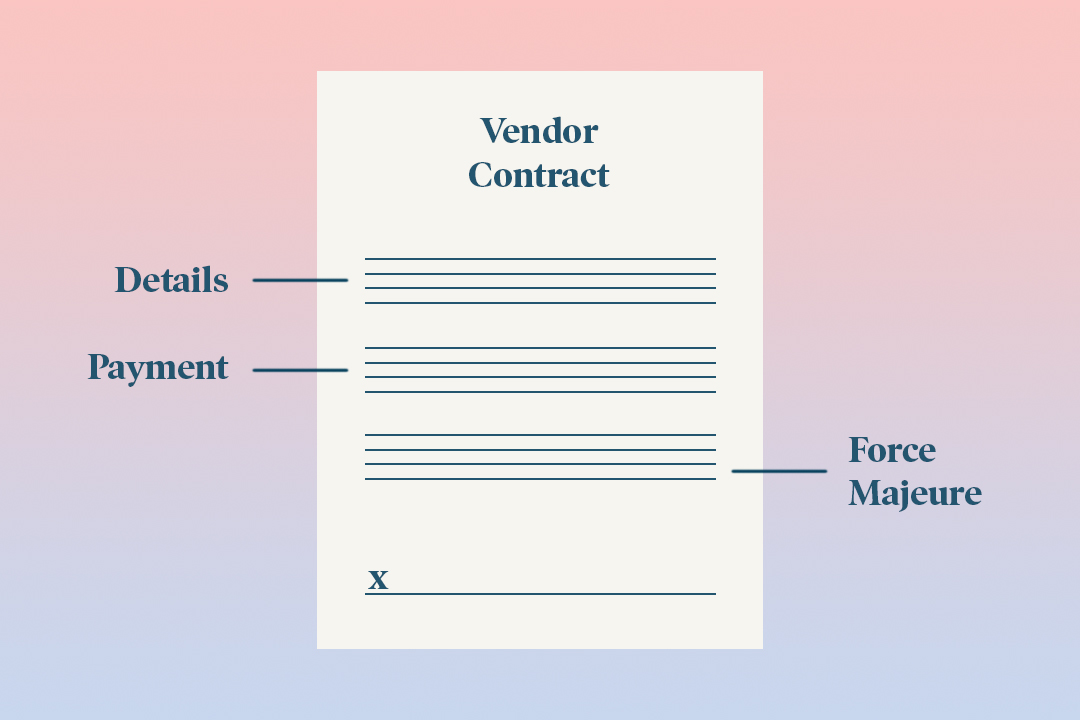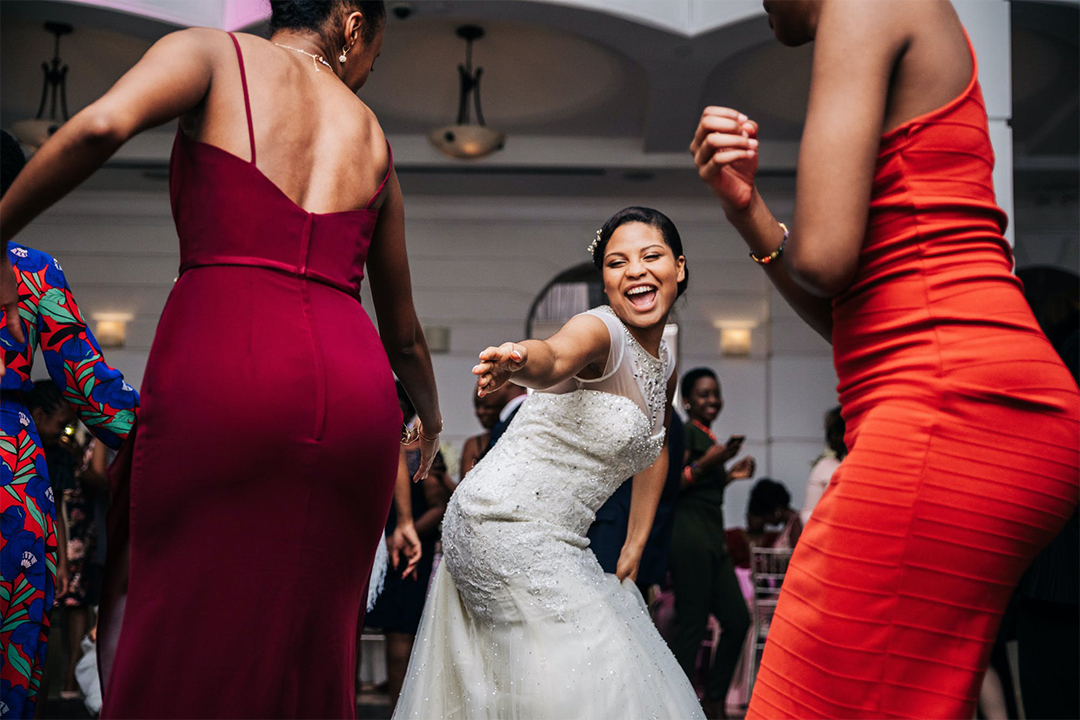- Expert advice/
- Wedding planning 101/
- Wedding planning questions/
- What to Look for in a Wedding Vendor Contract
- Wedding planning questions
What to Look for in a Wedding Vendor Contract
Getting ready to sign a wedding vendor contract? Learn about the important details to look for with this complete guide.
Last updated October 13, 2025

The First Look ✨
- Don’t be afraid to ask questions or for clarification about things that you don’t understand in a document that a vendor presents for signature.
- Plan for the best, prepare for the worst— map out undesirable scenarios and make sure that it’s spelled out in the contract.
- Look closely for provisions like force majeure clauses, liability waivers, and language about cancelations, payments, deposits, and termination.
It’s an anxious, uncertain time, to say the least, and particularly so when it comes to weddings and the copious amount of paperwork involved in putting together that special day. “Contracts are a whole different ball game now,” says Virginia Frischkorn of Colorado’s Bluebird Productions.
“We find that our clients are reading them :)” adds Alison Semmler, owner of Lifestyle Maven Events in NYC: “A lot of couples are feeling taken advantage of by vendors, and, on the flip side, vendors are feeling taken advantage of by couples.” So, how can you create mutual trust and feel confident about signing a binding agreement when the future is unpredictable? Here are some tips for what to look for in a wedding vendor contract.

Negotiating Contracts 101
Don’t simply assume that a wedding vendor contract is a final word. “The best advice is that you should consider it as a negotiable item,” says Bay Area Wedding Planner Olivia Wong. “The worst thing a vendor can say to a request for changes in a contract is no. A great vendor will also listen and hopefully accept a few of your change requests.” Adds Bay Area Wedding Planner Ashley Smith, “If you have an existing contract that doesn’t mention COVID-19 or pandemic-related clauses and you would like to ensure [that] you are on agreeable terms with the other party, ask to create an addendum with both parties’ signatures.”
Don’t be afraid to ask questions. If you don’t understand something, ask the vendor to explain it to you. “Sometimes clauses in the contract are just pulled forward from someplace else,” Wong says. “If something doesn’t make sense to you, ask! If they can’t explain it, ask for it to be removed or stricken out.”
And remember, keep your best interests in mind, and look for places in the contract to make clauses more amenable to you or to give you a little more leverage. “Most businesses have sought legal language to protect themselves about this and how to proceed if another pandemic arises, or this one is dragged out for months/years to come,” says Smith. “Make sure this language is also covering you, not just the business you are seeking services from.”
“Add something along the lines of ‘The client will be given the first right of refusal,’ or even state in the contract that if there are any changes at the vendor, they must notify the client immediately,” Wong says. “While this seems like common sense, a vendor may not inform you of any changes, like venue constructions, until closer to your date, leaving you with less time to adjust your plans or find another wedding venue. Or, a vendor could accidentally double book and pick the other client instead of you. Then, you have left in a bind [with] very little recourse.”
Read Over Your Contracts With a Fine-Toothed Comb Before Signing
You’ve jumped into wedding planning with gusto, and—score!—you’ve found a special location or vendor that you love. Your impulse might be to sign the contract quickly to lock down what you want. But consider resisting the temptation to do so. Always take the time to read your contracts carefully before signing a wedding photographer, florist, or another wedding professional for your big day.
- Make sure the contracts cover every expectation and discussed item clearly and comprehensively. If there’s anything in the contract that differs from what you’ve discussed with the vendor, suggest language that reflects your understanding and/or ask for clarification.
- Make sure that it’s clear what services they’re performing and what (and how and when) you’re paying for such services.
- Make sure that you understand and agree to the additional charges described, or make sure that there will not be any additional charges.
- If certain health-related precautions are important to you, such as PPE, hand-washing, and testing, make sure that it’s specified and clear.
Plan for the Best, Prepare for the Worst
You want your special day to go swimmingly, but it’s important to map out any undesirable scenarios. (And in the time of COVID-19, this might be more likely than you think!) Keep in mind that many vendors have already done so, with their interests in mind, so you want to think about your interests, too. For example, some wedding vendor contracts drafted since the ongoing pandemic began to stipulate that if a vendor is unable to provide services because of circumstances outside of its control for any reason (including government intervention), the client is not entitled to any refund of the fees.
- Safety precautions and health measures: Make sure that the vendor is doing all they can on their end in terms of safety measures. For example, ensuring PPE usage, maximizing social distancing, and ensuring that they don’t work if they’re sick. (Also consider contingency plans and what happens if they are COVID-19 positive or otherwise unavailable.)
- Changes in rules about gatherings: Negotiate and discuss what happens if there’s a sudden change in maximum occupancy for space, due to regulations related to social distancing or social gatherings.
- Negotiate and discuss what happens if a curfew is in effect.
- Consider contingency plans with your vendor, and address what happens in the event of such contingencies.
- Breach of contract: And more generally, what happens if the vendor breaches the terms of the contract? How will you and the vendor address this situation?
- Do they get an opportunity to cure the breach in a reasonable amount of time?
- Do you get a refund?
Whatever you settle on, make sure that all of this is in the contract.
Provisions to Look Out For
Read through your wedding contract closely, and make sure that you understand every word. But, as we navigate through the COVID-19 pandemic (and generally, as things inch toward a semblance of normalcy), here are some common clauses to look out for.
- Force majeure: Force majeure clauses typically excuse a party’s non-performance under a contract when extraordinary events prevent such party from fulfilling certain obligations. You’ve likely heard this phrase a lot in the past few months.
- That said, don’t assume that because there are the words “force majeure” that the wedding contract has considered a pandemic. It’s not a magic phrase.
- Typically, there’s a high bar for the applicability of force majeure language. If it ever comes to litigation, courts will likely look to whether (a) the extraordinary event qualifies as a force majeure under the contract, (b) whether the risk of non-performance was foreseeable and able to be mitigated, and (c) whether performance is truly impossible.
- Be specific and comprehensive about what triggers “force majeure”: Make sure the language considers COVID-19 and related public safety interventions by governmental authorities. “Many existing contracts do not cover and will not cover pandemic-related occasions,” points out Smith. “Ask to specifically name COVID-19 and future pandemics in this case to your new contracts.”
- Also, be clear about who can invoke this clause and when and how this clause may be invoked.
-__ Rescheduling/cancellation:__ If you’re set on a certain wedding venue and need to reschedule (and a certain vendor isn’t available on that rescheduled date) or cancel, what happens to your contract with that vendor? Are there any related fees for rescheduling or cancellations?
“I’ve seen many vendors be more flexible with rebooking and cancellation clauses in recent months, given the last few months,” notes Wong. “Many vendors are very understanding of the current market and will try to win your business,” Semmler adds that most vendors are not charging postponement fees, except wedding planners, who work additional time if a wedding is postponed.
Finally, “in the event of a reschedule or postponement, please be understanding with partners, as they offer their available dates to you,” says Bay Area Wedding Planner Lea Stafford. “Our event dates are essentially inventory, once you have secured a date on our calendar, the inventory has been claimed.”
-
Payments and deposits/retainers: Vendors typically ask for a non-refundable retainer or deposit to lock down their services on a certain time and date. But what happens if the event cannot go on as scheduled in the manner initially contemplated?
- Discuss and understand the schedule and method of payments.
- Discuss and understand the timeline and method of refunds.
- Is the deposit transferable in the event of a reschedule?
- What happens to any payments already made should something happen and the event cannot go on as scheduled or in the manner initially contemplated?
-
Termination: What happens if you’re just not happy with your vendor or if they do something that breaches the terms of the contract? How will you and the vendor address this situation?
- Do they get an opportunity to cure the breach in a reasonable amount of time?
- In what event do you get a refund?
-
Indemnification and liability waivers: Often vendors will have such language in their contracts.
- An indemnification provision comprises language to shift the risk between parties to a contract. Often a vendor will want language where you indemnify them: If they get sued by a guest or another vendor, you’re on the hook to defend them and for any damages.
- A liability waiver says that you won’t sue the vendor if something happens at your event. More and more vendors are introducing liability-waiver language, particularly related to COVID-19 and public health. Some venues even have liability waivers that require guests to sign.

With so many details involved in the planning of weddings, it’s easy to quickly sign off on a contract without looking closely at it (particularly these days, when it’s so easy to provide an electronic signature). But it’s extremely important to pay attention to the language that you’re agreeing to. And make sure that you retain copies of every contract, signed by all parties, for your records (this goes for any addendums, amendments, and modifications to the contract, as well). Whether you're booking a wedding photographer in Phoenix or a florist in Los Angeles, don’t just sign and forget about your wedding paperwork; you never know when something will come up and you need to refer to it.
Up next for you

10 Questions to Ask Your Wedding Videographer
Inspiration
Read on for our list of the top 10 questions to ask a wedding videographer to determine if they're the best fit to capture your celebration.

Wedding Catering Costs: Real Numbers and Budget Tips
Advice
Average catering cost for wedding is $6,927 nationwide, with most couples spending between $5,500 and $8,300 according to Zola’s 2025 index.

Wedding Live Band Cost: Planning Your Music Budget
Advice
The national average cost for wedding music (including bands and DJs) is $1,567, with most couples spending between $1,300 and $1,900. Live wedding bands specifically start around $2,500 for small acoustic groups and can reach $10,000+ for full show bands. Allocate about 5-8% of your budget to live music.

How Much To Tip Wedding Vendors
Inspiration
Confused on how much to tip wedding vendors, which vendors to tip, and when to distribute tips? Fear not: explore our guide for tipping wedding vendors.
- Expert advice/
- Wedding planning 101/
- Wedding planning questions/
- What to Look for in a Wedding Vendor Contract
Find even more wedding ideas, inspo, tips, and tricks
We’ve got wedding planning advice on everything from save the dates to wedding cakes.
